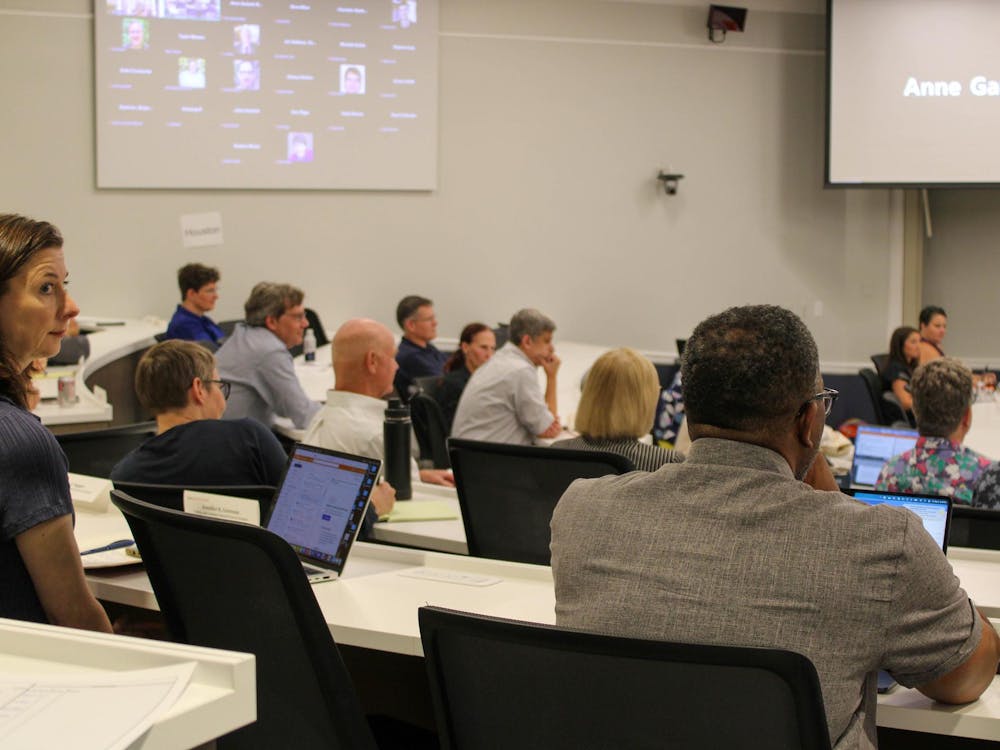A bomb threat on New and Old Cabell Halls yesterday tested the effectiveness of the University's bomb threat protocol and created a hectic and unique situation for students and visitors alike.
During the incident, the new University protocol, which designates alternative class meeting sites, came into effect for the first time. The procedure was developed after the previous four bomb threats caused numerous class disruptions.
According to University Police Sgt. Melissa Fielding, a telephone bomb threat was called in against New and Old Cabell Halls yesterday shortly after 9 a.m.
"The call went into an office in [New] Cabell Hall," Fielding said.
Fielding was unable to release details, but said the police are "working on some leads" on the five bomb threat incidents in the past two months.
Shortly after the bomb threat, authorities mobilized the area behind Garrett Hall as a "command center." The center, which included a bus of specialized police equipment, was operational by about 10 a.m. The center served as a coordinating area for state police, Charlottesville police, the fire department and University officials.
The bomb search included two Charlottesville police dogs trained to sniff out bombs.
The Provost's Office and College administrators, after the threat that occurred March 8, worked to ensure that professors developed alternative bomb threat meeting sites and announced them to their students beforehand. For large classes, professors may give their students a temporary alternate meeting spot and contact the Provost's Office to obtain an appropriately-sized relocation site.
The Provost's Office relocated 16 classes, including one government department lecture of over 180 students.
Many professors held class on the Lawn, in the Amphitheater or on the steps of other buildings. However, news of the bomb threat spread slowly and some students remained confused.
The University still is deciding if they will reinforce or add to the new protocol.
"The protocol was sent out to everybody," said Richard J. Sundberg, associate dean for administration in the College. "However, it was sent out on Thursday of Spring Break so it's conceivable that it will need to be redistributed."
Increased attendance at spring admission tours added to the confusion on Grounds as hundreds of prospective students toured the University while police investigated the bomb threat.
"We haven't had any standard thing to say" about the bomb threats, third-year University Guide Heather Hightower said. "I did mention that it might be a bomb threat and that we've had a series of bomb threats which might be some sort of prank."
Other University Guides also tried to downplay the situation.
"For the most part, they didn't even notice," said third-year University Guide Sara Hendon, who gave an 11 a.m. tour to a group of high school students. "I don't remember much police tape or anything."
While visitors were curious, they also remained understanding.
"Everybody has lots of questions as to why they're happening and who's behind it," Hightower said. "I think people are a little alarmed, but most people on your tour know that things like this don't only happen at strange places."
Despite an understanding reaction from visitors, "bomb threats at U.Va. are uncommon," said Susan Harris, assistant to University executive vice president and chief operating officer Leonard W. Sandridge. "These are the first in about seven years."
Previous bomb threats against the University occurred Feb. 12, March 1, 7 and 8.
University Police and Crime Stoppers are offering a maximum $3,500 reward for information leading to the arrest and conviction of persons responsible for any of the five telephone bomb threat incidents since Feb. 12.
The reward is comprised of $1,000 made available through the Crime Stopper program and $2,000 of local funds held by the University.
Individuals with information about the origin of the bomb threat are urged to call the Crime Stopper line at 977-4000.






